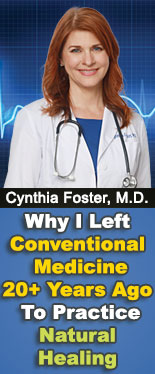by Cynthia Foster, MD
This page is devoted to educating consumers on the most dangerous medications and medical procedures so that they may make informed decisions regarding their personal health care.
The following is a list of medications which have either been contaminated, defective, or have been considered so dangerous by the medical profession that they have been withdrawn from the market. This page is also reserved for dangerous diagnostic procedures.
- Midazolam, Drugs Manufactured by Able Laboratories, Famotidine - injection
To learn more about potentially harmful drugs, visit the FDA's website and look for the "Dear Health Professional" letters at http://www.fda.gov/medwatch/safety.htmThe Institute of Medicine found that as many as 98,000 hospitalized Americans die every year and 1 million more are injured as a result of preventable medical errors that cost the nation as estimated $29 billion. Adverse drug reactions were the fourth leading cause of death in the United States in the year 2000 - more common than breast cancer, AIDS or traffic accidents - with costs of more than $170 billion. In addition to these costs, The Centers for Medicare and Medicaid stated in a recent report that the nation spent $140.6 billion in the year 2000 on prescription drugs.
Letters From Pharmaceutical Companies:
What follows is information contained in FDA and pharmaceutical letters to health professionals. These letters contain cautions and dangers so important, that they are mailed to all health professionals. Reporting to the FDA's MedWatch system is currently voluntary. When adverse effects occur in a patient taking a medication, it is optional whether or not the doctor wants to report it to the FDA. From this, we can assume that the rate of adverse effects is much higher than what are being reported. From the high number of medications on this list, one may begin to question the ability of government agencies to protect the American public from dangerous pharmaceuticals.
Drugs that have been withdrawn due to serious side effects :
1. Duract, pain reliever: withdrawn June 1998 Linked to 4 deaths and 8 liver transplants.2. Phenylpropanolamine: ingredient used in many cough and cold medications and over the counter weight loss medications increased risk of hemorrhagic stroke.
Nov. 6, 2000
"The Food and Drug Administration (FDA) is taking steps to remove phenylpropanolamine (PPA) from all drug products and has requested that all drug companies discontinue marketing products containing PPA. In addition, FDA has issued a public health advisory concerning phenylpropanolamine hydrochloride. This drug is an ingredient used in many over-the-counter (OTC) and prescription cough and cold medications as a decongestant and in OTC weight loss products.Scientists at Yale University School of Medicine recently issued a report entitled "Phenylpropanolamine & Risk of Hemorrhagic Stroke: Final Report of the Hemorrhagic Stroke Project." This study reports that taking PPA increases the risk of hemorrhagic stroke (bleeding into the brain or into tissue surrounding the brain) in women. Men may also be at risk. Although the risk of hemorrhagic stroke is very low, FDA recommends that consumers not use any products that contain PPA.
FDA’s Nonprescription Drugs Advisory Committee recently discussed this Yale study along with additional information on phenylpropanolamine. The Advisory Committee determined that there is an association between PPA and hemorrhagic stroke. It recommended that PPA be considered not safe for over-the-counter use."
5. Fenfluramine and Dexfenfluramine (Fen-Phen), appetite Suppressants: withdrawn September 1997 when studies found heart valve abnormalities occurred in 31% of patients tested.
Apr 17, 2000 - The diet drug phentermine has been banned in the UK following a European Commission ruling for all member countries to withdraw appetite suppressant medications from the healthcare market because of their high risk to cause heart disease and high blood pressure in patients.Other appetite supressants or diet drugs that have been withdrawn from the UK market in past years include fenfluramine (Ponderax) and dexfenfluramine (Adifax) in October 1997. Another diet drug, amfepramone (Tenuate Dospan, Diethylpropion) has not been actively marketed in recent years, according to a DOH spokesperson.
According to the US Food and Drug Administration's MedWatch patient advice program, phentermine is three times as likely as obesity to cause high blood pressure. According to current medical research, the drug works as an appetite suppressant, but in the process, can raise blood pressure, particularly in people who already have high blood pressure.
For around twenty years, the drug Phentermine was prescribed by doctors incombination with fenfluramine to promote weight loss in obese patients. In 1997, it was withdrawn from the UK and from the US. The reason for the withdrawal was research published in the a 1997 issue of the New England Journal of Medicine which warned of the high numbers (over 30%) of previously healthy women who had developed valvular heart disease in association with taking these weight loss drugs.
Much safer alternatives do exist such as aromatherapy, Liver Regeneration Program, cayenne, juicing and/or vegetarian diet.
6. Rezulin: caused severe liver damage and death. Rezulin, a diabetes agent manufactured by Warner-Lambert was finally withdrawn from the market on March 21, 2000 after its label had been strengthened several times. It had caused fatal liver toxicity in at least 26 people worldwide. For more information on healing diabetes naturally.
7. Vioxx: drug used to for arthritis, pain and menstrual symptoms increased heart attacks and strokes.
FDA Public Health Advisory on September 30, 2004:"Merck & Co., Inc. today announced a voluntary withdrawal of Vioxx from the U.S. market due to safety concerns. Vioxx is a prescription COX-2 selective, non-steroidal anti-inflammatory drug (NSAID) that was approved by FDA in May 1999 for the relief of the signs and symptoms of osteoarthritis, for the management of acute pain in adults, and for the treatment of menstrual symptoms. It is also approved for the relief of the signs and symptoms of rheumatoid arthritis in adults and children.
The agency was informed by Merck & Co., Inc on September 27, 2004 that the Data Safety Monitoring Board for an ongoing long-term study of Vioxx (APPROVe) had recommended that the study be stopped early for safety reasons. The study was being conducted in patients at risk for developing recurrent colon polyps. The study showed an increased risk of cardiovascular events (including heart attack and stroke) in patients on Vioxx compared to placebo, particularly those who had been taking the drug for longer than 18 months. Based on this new safety information, Merck and FDA officials met the next day, September 28, 2004, and during that meeting FDA was informed that Merck was voluntarily withdrawing Vioxx from the market place.
The risk that an individual taking Vioxx will suffer a heart attack or stroke related to the drug is very small. Patients who are currently taking Vioxx should contact their physician for guidance regarding discontinuation and alternative therapies.
FDA is working closely with Merck to coordinate the withdrawal of this product from the U.S. market place."
Restricted drugs:
1. Trovan: antibiotic that can lead to liver dysfunction &/or liver failure. Due to post-marketing reports of very rare outcomes of liver dysfunction and/or liver failure in patients who have been prescribed Trovan tablets and intravenous formulations, it is recommended that the use of this antibiotic be restricted to certain serious and life and limb-threatening infections. Trovan was approved by the FDA in Dec. 1997. More than 2.5 million prescriptions have been written for Trovan worldwide from February 1998 though early May 1999. During this time, Pfizer has reported 140 cases of hepatic adverse events to the FDA. Four patients died, and 14 cases of acute liver failure were strongly linked to the use of the drug. Of these cases, 4 patients required liver transplant (one of whom subsequently died), and an additional 5 patients died from liver-related illness. (Letter to health professionals from Pfizer Inc. June 10, 1999) Its use has been restricted to certain serious infections occurring in hospitals or long term nursing care facilities only.
2. Propulsid: a drug used for GERD and gastroparesis (delayed emptying of the stomach usually found in diabetics), caused severe heart rhythm abnormalities. The original warning: "Due to reports of serious heart arrythmias and deaths in people taking Propulsid (cisapride), the label had been changed to reflect these dangers. In June of 1998, the FDA issued a statement reporting 38 deaths in the United States between 1993 and 1998 in people taking cisapride. Cisapride, which is manufactured by Janssen Pharmaceutica, is approved for treating the symptoms of night time heartburn. The revised label states that 'QT prolongation, torsades de pointes (sometimes with syncope), cardiac arrest, and sudden death' have been reported in patients on cisapride who were not taking a contraindicated drug." (Intern Med News, August 1, 1998, p. 40, Propulsid’s Label Carries New Heart Warning) Syncope is the medical term for fainting. The patients taking cisapride were not taking any drugs that would interact with it, so these serious side effects were not expected. What happened to Propulsid 6 months later:
"Propulsid will be removed on July 14, 2000 due to severe complications associated with its use. Propulsid, a stimulant of the gastrointestinal tract, was mainly used for gastroesophageal reflux disease (GERD) and gastroparesis (weakness of the stomach causing delayed emptying, commonly occurring in diabetics). Propulsid has been associated with serious heart arrhythmias, including ventricular tachycardia, ventricular fibrillation (almost always fatal), torsades de pointes (sometimes with fainting) and QT prolongation. From July 1993 through December 1999, there were 341 of these adverse effects, including 80 which resulted in death. Although Janssen, the manufacturer of the drug, recommended labeling changes and sponsored educational programs to ensure the safe prescribing of Propulsid, the rate of reports of adverse effects did not decline adequately. It will no longer be marketed, but will only be available through an investigational limited access program." (Janssen Drug Notice, April 12, 2000)Keep in mind that reporting of adverse events is voluntary, so the actual number of persons who suffered from complications to this drug may actually be much high.
Propulsid in the Press
In November of 1999 in Pittsburgh, a coroner ruled that a hospital study designed to test the drug Propulsid (cisapride) on children was partly to blame for the death of a 9-month-old child, Gage Stevens.
Gage was 1 of 100 children participating in a study to determine the safety of the drug to treat gastroesophageal reflux in children. The drug was already approved for use in adults, but not in children. Gage, who suffered from heartburn and chronic diarrhea, which Propulsid was designed to treat, had been taking the drug for six months when he suddenly died.
The coroner had originally blamed the child's death on sudden infant death syndrome, but later changed the death certificate to say that the drug Propulsid was also a cause. The coroner said he reopened the case after being contacted by the ``CBS Evening News'' and reviewing additional information from the baby's family and the FDA. CBS first reported the link between Gage's death and the drug in May of 2000.
The drug has been associated with heart rhythm abnormalities and 80 deaths, though the FDA said it can't prove the drug caused any deaths.
The baby's parents, Scott Stevens and Gretchen Stewart of Munhall, claim they signed a consent form at the hospital that incorrectly said the drug was approved by the FDA for infants.
In a statement released Wednesday, Children's Hospital officials admitted the form was wrong. They said it told parents the drug was approved because officials believed it would be approved in the very near future. They also claimed the consent form listed the drug's potential side effects and risks, including heart rhythm problems.
The hospital stopped the trial in March of 2000 after the FDA told officials of a possible link between the drug and Gage's death.
After consulting with the FDA, Janssen Pharmaceutical Inc., a subsidiary of Johnson & Johnson, announced in April that it would stop marketing the drug, but would make it available on a limited basis to some patients.
1. Midazolam: within this
medication, a dangerous drug precipation with saccharin may cause
serious adverse effects and/or death.
From Roche Laboratories:
March 1, 2002
"Dear Health Care Professional:
Roche Laboratories is conducting a voluntary drug recall of VERSED Syrup, 188 mL (2 mg/mL) bottle, Lots U009-50 and U0010-50, which you may have received on or after December 27, 2001.
VERSED is indicated for use in pediatric patients [children] for sedation, anxiolysis and amnesia [to cause memory loss] prior to diagnostic, therapeutic or endoscopic procedures or before induction [administration] of anesthesia.
Roche is taking this action because of the potential presence of a crystalline precipitate of an insoluble complex of midazolam [the medication] and saccharin [a known cancer-causing artificial sweetener] inside the bottle. The presence of this precipitate causes a lack of uniformity in the product and may result in the administration of a super [too high] or sub-potent [too low] dose. The administration of a variable dose of VERSED Syrup may result in adverse consequences. Due to this possibility we are designating this as a Class I recall. A Class I recall is defined as a situation in which there is a reasonable probability that the use of or exposure to a violative product will cause serious adverse health consequences or death..."
2. Drugs Manufactured by Able Laboraties:
The Food and Drug Administration notified consumers and healthcare professionals of a nationwide recall of all
manufactured drugs (mostly generic prescription drugs, including drugs containing acetaminophen) from Able
Laboratories of Cranbury, NJ, because of serious concerns that they were not produced according to quality
assurance standards. Able Laboratories has ceased all current production. FDA recommends that people who
have been taking drugs produced by this firm speak with their health care provider or pharmacist to obtain
a replacement drug product. Consumers should continue taking the medication until they have spoken with their
health care provider. FDA has provided a list with the names of the recalled drugs and their imprint codes,
marks (usually letters and numbers) found on the surfaces of drugs.
From the FDA:
May 27, 2005
3. Famotidine: Anti-Ulcer Drug Recalled
Bedford Laboratories and FDA notified healthcare professionals of the voluntary recall of one lot of
Famotidine Injection, 20 mg/2 mL (NDC 55390-029-10), Lot# 609336, exp. 04/06, due to a lack of sterility
assurance. This prescription product was distributed in August 2004 throughout the United States to
wholesalers and distributors, who further distributed the product to hospitals.
From the FDA:
April 29, 2005
Neurontin: Drug for Seizures and Nerve Pain Recalled. Pfizer Inc. and FDA notified healthcare professionals of the voluntary recall of one lot (40,000 bottles) of 100 mg capsules of its epilepsy medication, Neurontin, after a manufacturing mechanical failure resulted in some bottles containing empty or partially filled capsules. Patients taking Neurontin to control epilepsy could experience seizures from a missed dose of the product. 100 mg strength capsules from lot #15224V -- distributed in October and November, 2004 -- are included in the recall. The production lot was distributed only in the United States. No other Neurontin lots were affected. April 22, 2005
The
federal government has begun to evaluate whether medical X-rays
should be declared a carcinogen [cancer-causing substance], a move
experts say could reduce unnecessary exposures to radiation and
force doctors to pay closer attention to the risks. The evaluation
will be conducted over the next year. The risks from medical
sources are controversial and often downplayed by physicians. A
spokesperson for the America College of Radiology and professor
or radiology at the University of New Mexico says radiologists are
supposed to "optimize" radiation doses by exposing patients only
to enough radiation to obtain a clear image. The risk of exposure
is balanced against the medical benefit. A CT scan is equal
[in radiation exposure] to 100 chest X-rays. For every 1 million
children scanned with CT, an estimated 1,500 will develop cancer
two decades later. As many as 3 million children receive CT
scans each year. USA Today, December 31, 2002.
[Dr. Foster's note: The most common type of cancers that
develop after radiation exposure are leukemia and thyroid cancer.]
Dr. Cynthia Foster, M.D.
A Conventionally Trained Medical Doctor Who Left Medicine Almost 20 Years Ago to Practice 100% Holistically
 After receiving a required Hepatitis B vaccine for entry into medical school, Dr. Cynthia Foster became severely ill with grand mal epileptic seizures. The seizures occurred twice daily for almost four years – almost the entire time she was in training to become a conventional medical doctor at the University of Texas Health Science Center. Putting her life into the hands of a very experienced holistic nurse who was using holistic healing methods with unprecedented and extraordinary results, she refused all medications or other medical interventions for the seizures.
After receiving a required Hepatitis B vaccine for entry into medical school, Dr. Cynthia Foster became severely ill with grand mal epileptic seizures. The seizures occurred twice daily for almost four years – almost the entire time she was in training to become a conventional medical doctor at the University of Texas Health Science Center. Putting her life into the hands of a very experienced holistic nurse who was using holistic healing methods with unprecedented and extraordinary results, she refused all medications or other medical interventions for the seizures.
Using only natural methods as her treatment, the seizures went into complete remission, and she has been seizure-free for over 20 years. Her first book Stop the Medicine tells the incredible story of her miraculous recovery as well as giving a behind-the-scenes look at the Modern Medical Establishment. In her search for healing, she has traveled the world learning and incorporating natural methods into her holistic practice, including herbal detox, natural supplements, aromatherapy, hydrotherapy, energy healing, mind-body medicine, healing visualizations, juice fasting and therapeutic foods.
After receiving her MD degree, and refusing to practice medicine because of the miraculous healings she had seen in others and experienced for herself, she began her practice using only natural methods to heal her patients, specializing in teaching people how to heal themselves with simple remedies and techniques, and has been able to repeat the miraculous healing results with her patients that she herself had personally experienced.
Over the past 20 plus years, she has served many roles including not only healing practitioner, but also herbal product trainer and spokesperson for herbal product companies, and also founded her own pharmaceutical strength herbal product line called “Dr. Foster’s Essentials” to address the health problems she was seeing in her practice. She noticed over a period of two decades of seeing patients, that they usually brought her grocery bags full of so-called “natural” supplements that simply did not work. She founded Dr. Foster’s Essentials, insisting on including herbal extracts up to ten times stronger than what is traditionally available in grocery stores, drug stores health food stores, and even online, as she felt these “mass-marketed” remedies were too weak and watered down to heal anything as serious as what she had experienced with the epilepsy.
A highly sought after speaker and university instructor, she has lectured worldwide on a wide range of topics from the use of herbs to emotional healing to conventional medicine classes for acupuncture students. She has been interviewed numerous times on radio programs and mentioned in the press as well as featured in magazines, newspapers, and on television. Current projects include a second book describing how to use herbs and natural healing techniques to overcome life-threatening, chronic and incurable health issues.
"A
Rock Pile Ceases To Be A Rock Pile
The Moment A Single Man Contemplates It,
Bearing Within Him The Image Of A Cathedral."
- Antoine de Saint-Exupery












